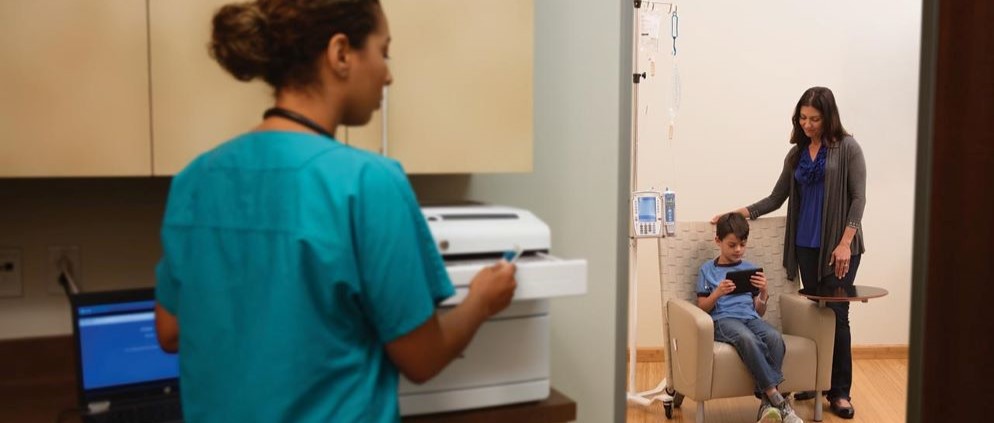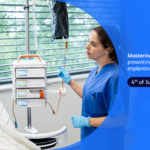Launching an OPAT service at Swansea Bay Health Board
In Wales, several government initiatives are aimed at bringing healthcare services closer to people’s homes, making it easier for people to access care, and improving the efficiency of hospital resources, including the most effective utilisation of hospital beds.1,2,3
Frankie Thompson, Lead Nurse Vascular Access and OPAT Services, Swansea Bay University Health Board, presented the challenges and benefits of implementing an outpatient parenteral antimicrobial therapy (OPAT) service at the 8th World Congress on Vascular Access (WoCoVA), held 17–19 April 2024 in Prague, Czech Republic.
The OPAT service implemented at the Swansea Bay Health Board offers an example of how shifting services out of hospitals, and into communities, can benefit patients, care providers and hospitals. “It has emerged as a real critical tool for hospitals to tackle the challenges associated with a shortage of beds,” said Ms Thompson. Ms Thompson’s session covered the scope of the OPAT program, the initial challenges, the initiatives that supported the launch, and the outcomes.
More on this topic: Convenience packs: streamlined IV catheter care in the hospital and at home
Ms Thompson cited the United Kingdom’s “Start smart then focus: antimicrobial stewardship toolkit for inpatient care settings,” which provides evidence-based guidance for secondary care clinicians and leaders, as a foundational starting point for the OPAT service. OPAT is one of the options outlined in the toolkit when deciding how to proceed after reviewing the clinical diagnosis and the continuing need for antimicrobials at 48 to 72 hours.4 The antimicrobial review options include stopping antimicrobial prescription (if there is no evidence of infection); amending the antimicrobials (i.e., switching from IV to oral antimicrobials); referring to non-ward based antimicrobial therapy services (such as complex outpatient parenteral antimicrobial therapy [COPAT] or OPAT), or extending the same prescription and setting the next review date/time.4
As noted in the guide, OPAT offers high levels of satisfaction for patients, low rates of readmissions or complications and has demonstrated safety and clinical effectiveness.4 The guide was developed to reduce the risk of antimicrobial resistance while safeguarding the quality of care for patients with infections.4 “We know that the prudent use of antimicrobial agents is essential to maintain our effectiveness against increasing global antimicrobial resistance,”5 said Ms Thompson, referring to the literature.
OPAT for patients who don’t require a hospital stay: cost savings
Ms Thompson shared findings from a study by Dimitrova et al that compared costs associated with different models of OPAT delivery with costs of inpatient care across key infection groups managed via OPAT in the United Kingdom.6 The models included the outpatient clinic model, nurse home visits, self (or carer) administration (by bolus intravenous or elastomeric device) and complex outpatient antibiotic therapy.6
This health economic assessment showed that OPAT services were less costly than in-patient stays, and suitable for patients with infections who could be safely managed as out-patients.6 The study found that the lowest cost per treatment episode was associated with the self (or care) administration approach, while home visits by nurses were more costly.6
This demonstrated the potential for an OPAT service to deliver quality care for certain patient types in an outpatient setting, for significantly less cost than would be required for inpatient care.6 For the U.K. National Health Service (NHS), the estimated savings associated with treatment with the OPAT model was estimated at £60–77 million (€72–92.5 million)* over five years.6
Become a VAMbassador to get access to the full article
References
1 Phoenix T. Briefing: Bringing care closer to home. Welsh NHS Confederation. Published November 1, 2022. Accessed September 11, 2024. https://www.nhsconfed.org/publications/bringing-care-closer-home
2 Welsh Government. A healthier Wales: long term plan for health and social care. Welsh Government. Updated November 8, 2022. Accessed September 11, 2024. A healthier Wales: long term plan for health and social care | GOV.WALES
3 Welsh Government. Building Capacity through Community Care – Further Faster. Welsh Government. Published 2021. Accessed September 11, 2024. Building Capacity through Community Care (gov.wales).
4 UK Health Security Agency. Start smart then focus: antimicrobial stewardship toolkit for inpatient care settings. UK Health Security Agency. Updated 12 September 2023. Accessed September 13, 2024. https://www.gov.uk/government/publications/antimicrobial-stewardship-start-smart-then-focus/start-smart-then-focus-antimicrobial-stewardship-toolkit-for-inpatient-care-settings.
5 Chapman ALN, Patel S, Horner C, et al. Updated good practice recommendations for outpatient parenteral antimicrobial therapy (OPAT) in adults and children in the UK. JAC Antimicrob Resist. 2019;1(2):dlz026. doi:10.1093/jacamr/dlz026
6 Dimitrova M, Gilchrist M, Seaton RA. Outpatient parenteral antimicrobial therapy (OPAT) versus inpatient care in the UK: a health economic assessment for six key diagnoses. BMJ Open. 2021;11(9):e049733. doi:10.1136/bmjopen-2021-049733
This list of references to third-party peer-reviewed material and the sites they are hosted on are provided for your reference and convenience only, and do not imply any review or endorsement of the material or any association with their operators. The Third-Party References (and the Web sites to which they link) may contain information that is inaccurate, incomplete, or outdated. Your access and use of the Third Party Sites (and any Web sites to which they link) is solely at your own risk.
This presentation was developed by the presenter, and the findings, interpretations, and conclusions contained or expressed with it do not necessarily reflect the views of BD. To the extent this presentation relates to specific products, such products should always be used in accordance with the relevant instructions for use and other product documentation. This content should not be copied or distributed without the consent of the copyright holder. For further information, please contact: GMB-EU-MDS@bd.com
* Exchange rate: £1=€1.20 as of 23 October 2024
BD-137290




